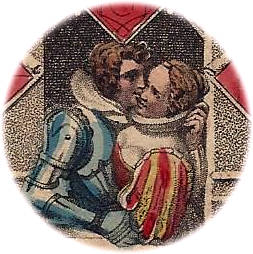Bartlett Ackermann Transformation
Pictorial playing cards published by C. Bartlett, New York, 1833.

Bartlett Ackermann Transformation, 1833
Pictorial ‘Transformation’ playing cards published by Caleb Bartlett, New York, 1833. The original designs are believed to be by Rudolph Ackermann and published in the Repository of Arts magazine, London, 1818-19. The American edition shown here is almost an exact copy of the Ackermann version, except that the colouring is much heavier and brighter than in the originals so that some details of the design are obscured. The deck is accompanied by a booklet in which each card is described in detail see excerpt →
Above: Pictorial playing cards published by Caleb Bartlett, New York, 1833. The descrition of the Seven of Diamonds given in the accompanying booklet reads: “A young lady is busily employed in knitting, and by her side is suspended her work-bag, which is formed by the diamonds, as is the corner of her handkerchief. The diamond composes the argand lamp, and decorates the vase and other furniture.” Images courtesy Larry and Tammy Northup.
REFERENCES
Dawson, Tom & Judy: The Hochman Encyclopedia of American Playing Cards, U.S. Games Systems Inc., 2000
NOTE: As has been previously noted, two card manufactures with similar names produced cards in the mid 19th century. That similarity of names, Caleb Bartlett, who produced cards from 1830 to 1850 and Charles Bartlet, a pseudonym of Samuel Hart, who produced cards only in 1845, can be the cause of some confusion when trying to affix the correct attribution to certain decks by either maker. Our listing for the Ackerman deck is a case in point. It was initially and erroneously attributed to Charles Bartlett. Card collectors should take note of the fact that the name Charles Bartlet is spelled with only one letter “T” while the name Caleb Bartlett is spelled with two letter “T’s”. The names of either maker are sometimes found on the Ace of Spades but in the case of Caleb Bartlett, his initials, C.B., are cleverly hidden on each court card, a feature that can aid in identification (from Rod Starling).

By Simon Wintle
Member since February 01, 1996
I am the founder of The World of Playing Cards (est. 1996), a website dedicated to the history, artistry and cultural significance of playing cards and tarot. Over the years I have researched various areas of the subject, acquired and traded collections and contributed as a committee member of the IPCS and graphics editor of The Playing-Card journal. Having lived in Chile, England, Wales, and now Spain, these experiences have shaped my work and passion for playing cards. Amongst my achievements is producing a limited-edition replica of a 17th-century English pack using woodblocks and stencils—a labour of love. Today, the World of Playing Cards is a global collaborative project, with my son Adam serving as the technical driving force behind its development. His innovative efforts have helped shape the site into the thriving hub it is today. You are warmly invited to become a contributor and share your enthusiasm.
Related Articles

Queen of Hearts card game
Alice in Wonderland card game featuring Disney characters on king-size cards.

National Gallery of Art
Fifty-three masterpieces from the collections of the National Gallery of Art, Washington.

Sea-Dog playing cards
Ships’ prows, figureheads and signal flags promoting Sea-Dog Line marine hardware.

Modern Swiss-German Pattern (carta.media)
Modernizing tradition: balancing clarity and continuity in regional card design.

Tactics Design
Late modernist Japanese playing cards designed by Masayoshi Nakajo for Tactics Design.

The Decadent Deck
Studies in the eroticism of the female body by Inge Clayton.

Historic Shakespeare
“Historic Shakespeare” playing cards featuring Shakespearean characters by Chas Goodall & Son.

Sunday Night / Nichiyoubi no Yoru
An irreverent, avant-garde deck unofficially titled "Nichiyoubi no Yoru" (Sunday Night), designed by...

Emilio Tadini playing cards
Beautiful dreamlike playing card designs by Emilio Tadini.

Rap Rummy
Rap Rummy made by Parker Brothers in 1926, only 4 years after the discovery of King Tutankhamen’s to...

German Travel Cards
A travel-themed educational deck helping American tourists visiting Germany.

Can You Believe Your Eyes?
“Can You Believe Your Eyes?” playing cards featuring visual illusions & other oddities.

Zürcher Festspiel 1903
Swiss-suited pack designed by Robert Hardmeyer featuring figures from art and politics.

An Anonymous Belgian Transformation Pack
Anonymous Belgian transformation pack borrowing many images from earlier designs by Braun & Schneide...

Never Mind the Belote
Limited edition Belote pack with designs by a collective of 24 street artists.

Playing card designs by Franz Exler
Reconstruction of playing cards from the original 1903 designs.
Most Popular
Our top articles from the past 28 days


















